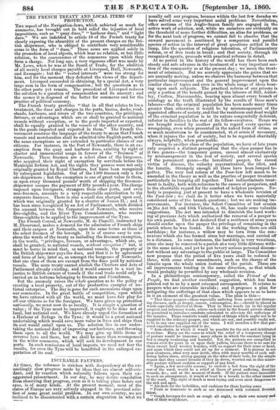THE TRENCH TREATY - AND LOCAL ITEMS OF PROTECTION.
THE repeal of the Navigation-laws, which achieved so much for commerce, has brought out in bold relief the injustice of local impositions, such as "quay dues," "harbour dues," and "light dues.' We are indebted to article 10 of the French treaty for clearly exposing the absurdity of the present charges on the Bri- tish shipowner, who is obliged to contribute very considerable sums in the form of "dues." These sums are applied solely in the promotion of local objects, which bear no relation, or but little relation, to the convenience of the commerce upon which they form a charge: Not long ago, a very vigorous effort was made by Mr. Lowe, when he was at the Board of Trade, for the abolition dell merely local charges payable at Liverpool, Hull, Newcastle, ,and Ramsgate ; but the "vested interests" were too strong for him, and for the moment they defeated the views of the depart- ment. Liverpool succeeded in obtaining, by a special Act, a very large sum in the form of compensation ; but the questions as to the other ports yet remain. The precedent of Liverpool reduces the solution to a question of compensation and its amount ; and the sooner it is disposed of the better for commerce and for the practice of political economy. The French treaty provides "that in all that relates to be a treatment, the dues and charges in the ports, basins, docks, road- steads, harbours, and rivers of the two countries, the privileges, fafours, or advantages which are or shall be granted to national vessels without exception, or to the goods imported or exported, shall be equally granted to the vessels of the other country, and to the goods imported and exported in them." The French Go- vernment construe the language of the treaty to mean that French vessels and merchanclize shall be admitted into English ports, with the same exemptions as are extended to particular classes of our citizens. For instance, in the Port of Newcastle, there is an ex- emption from the quay and harbour dues' existing by right of charter and. immemorial usage in favour of the " freemen " of Newcastle. These freemen are a select class of the burgesses, who acquired their right of exemption by servitude before the Municipal Reform Act, and the rights they possess were not only Originally granted by Royal Charters, but have been recognized by subsequent legislation. Out of the 1500 freemen only a few are shipowners ; but the exemption is one of great value to them, as upon every thousand pounds' worth of shipping the freeman- shipowner escapes the payment of fifty pounds ayear. The charge imposed upon. foreigners, strangers from other ports, and even non-freemen, amounts to a very respectable contribution to the corporate finances. There is also a small due charged upon coal, which was originally granted by a charter of James II.; and it his been since recognized by an Act of Parliament, which divided the amount between the Corporation of Newcastle, who receive five-eighths, and the giver Tyne Commissioners, who receive three-eighths to be applied to the improvement of the Tyne. The French Consul, at Newcastle' M. de Pianelli instructed by M. Thouvenel, makes a demand for the admission of French ships and, their cargoes at Newcastle, upon the same terms as those of the select freemen of the borough. It is of course easy to con- strue the words of the treaty as including the freeman exemption, in the words, "privileges, favours' or advantages, which are, or shall be granted, to national vessels, without exception ;" but, it must be borne in mind that, as national vessels, the property of
i
the British shipowner pays the dues, and that t s by agreement ana force of law, inter se, as amongst the burgesses of Newcastle, that one class of them are exempt from the dues paid by national vessels. The mere treaty cannot abolish the Charters and Acts of Parliament already existing, and it would amount to a vast in- justice toBritish owners of vessels if the coal trade could only be carried.on in bottoms belonging to freemen and Frenchmen. _But the anomaly raises the whole question as to the policy of c.reating a local property, out of the productive energies of' na- tional enterprise. The day is gone for such anomalous clogs upon our commerce. In the great battle of competition, upon which we have entered with all the world, we must have fair play for all our citizens as for the foreigner. We have given up protection nationally, we must now do so locally. It is simply a question of value ; if the Tyne must be improved, it ought to be done not at local, but national cost. We have already urged the formation of a, Harbour of Refuge in the Tyne ; it would be a great national undertaking which would save more value in lives and ships than its cost would entail upon us. The solution lies in our under- taking the national duty of improving our harbours, and throwing them open to all the world. We may give up little items of revenue here and there, but we shall be more than recompensed in the wider commerce, which will seek its development in our ports. In such remissions of local imposts, we need not fear the results, for even the Tyne will be benefitted in the enlarged ex- portation of its coal.


























 Previous page
Previous page